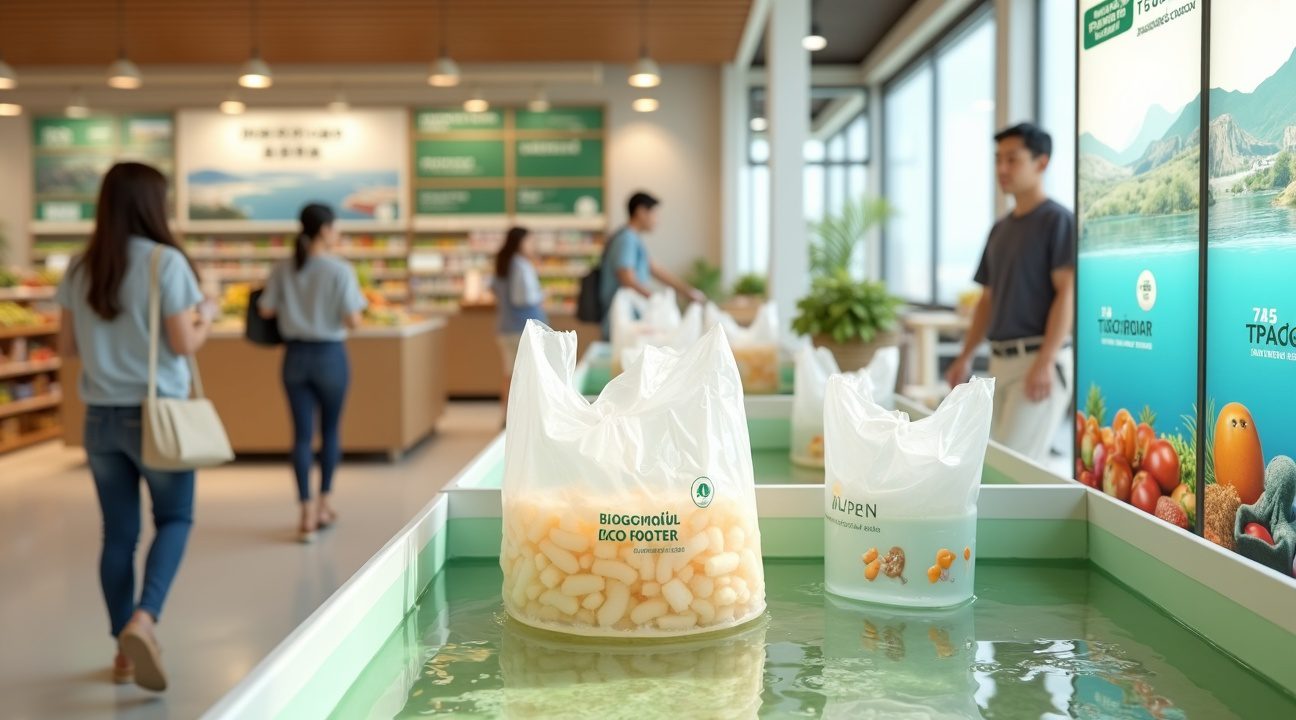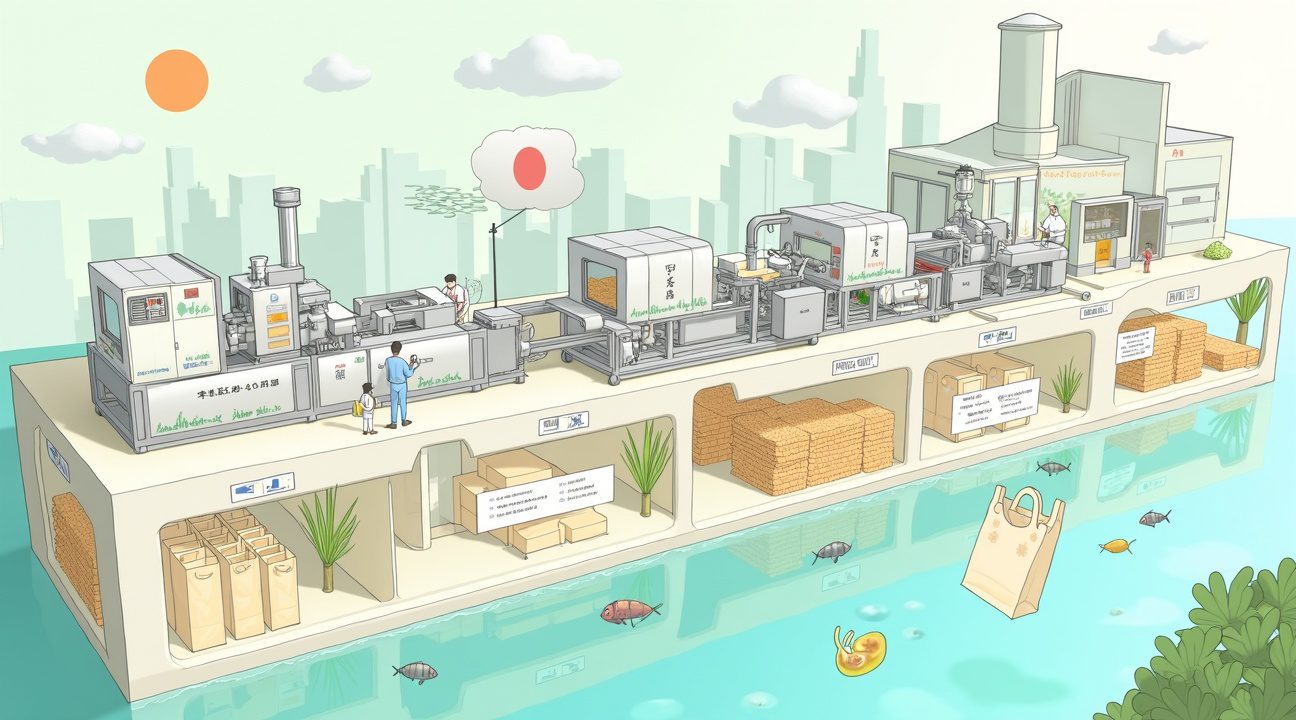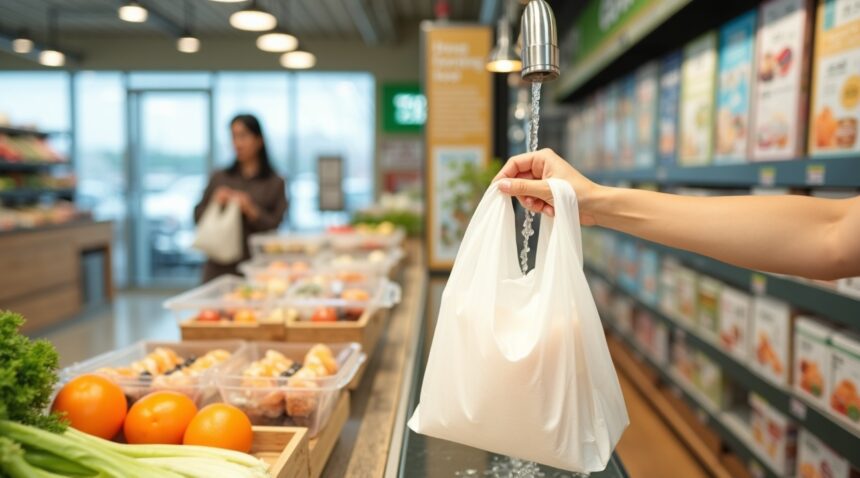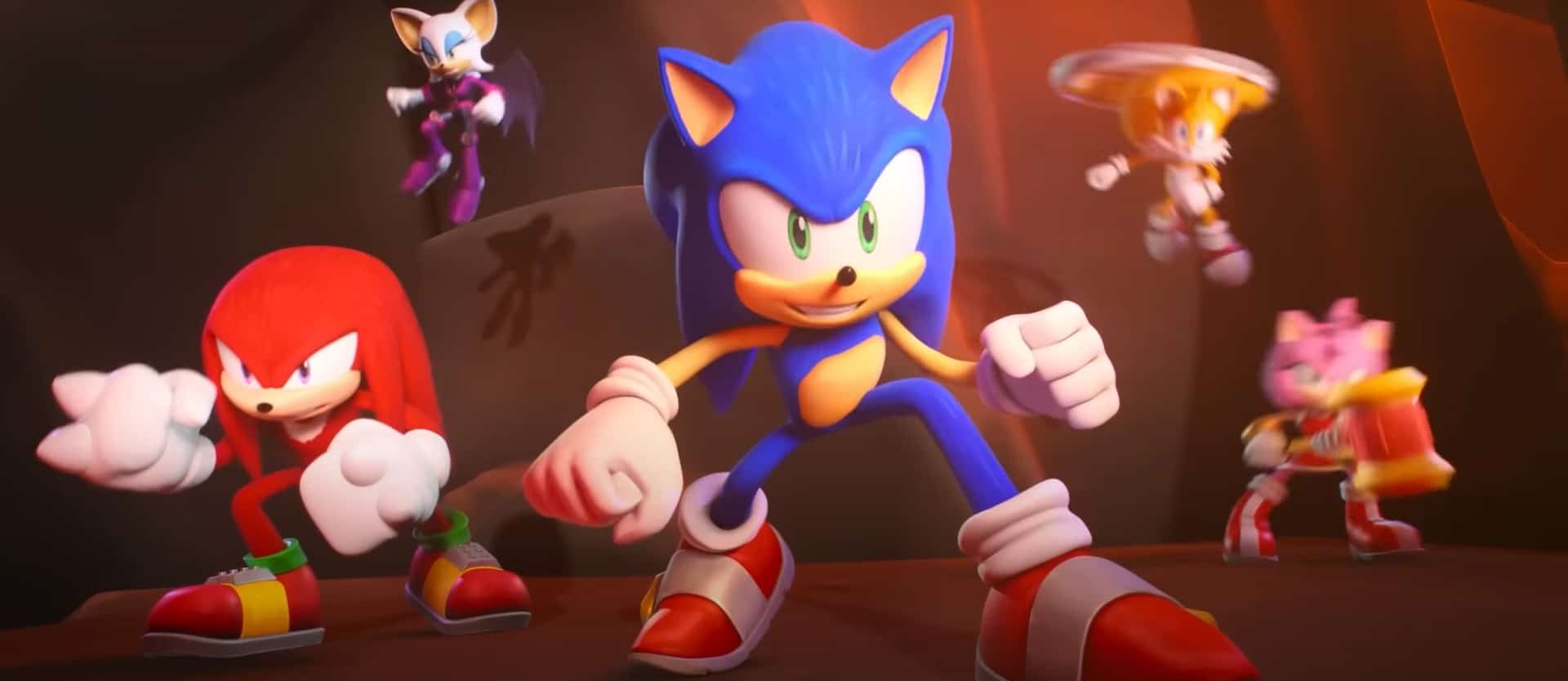Japan’s revolutionary potato starch grocery bags represent a breakthrough in sustainable packaging technology, completely dissolving in water within minutes while maintaining the strength needed for everyday shopping.
Key Takeaways
- Water-soluble design: Bags made from potato starch and plant-based materials dissolve completely in water within minutes, eliminating long-term environmental persistence.
- Marine life protection: Unlike traditional plastic bags that fragment into harmful microplastics, these bags break down into non-toxic substances safe for ocean ecosystems.
- Practical performance: The bags maintain structural integrity during normal use, resisting moisture from condensation while performing identically to conventional plastic bags for grocery transport.
- Market growth potential: Japan leads a rapidly expanding biodegradable bag market expected to grow from $374 million in 2023 to over $610 million by 2030.
- Consumer adoption success: Japanese shoppers have embraced the technology following 2020 regulations requiring fees for plastic bags, with over half now regularly using sustainable alternatives.
Innovative Material Technology
Japanese engineers have created grocery bags that vanish in water like sugar dissolves in coffee. The technology uses potato starch combined with other plant-based polymers to form a material that maintains bag strength during shopping trips. When exposed to water, the molecular structure breaks apart completely within three to five minutes.
Environmental Advantages
Traditional plastic bags persist in the environment for hundreds of years. They fragment into microplastics that contaminate food chains and accumulate in marine animals. Japan’s water-soluble bags eliminate this problem by decomposing into natural compounds that pose no threat to wildlife or ecosystems.
Durability and Consumer Practicality
The bags resist normal moisture exposure during transport. Condensation from cold items or light rain won’t trigger premature dissolution. However, deliberate water contact initiates rapid breakdown. This balance makes them practical for consumers while maintaining environmental benefits.
Market Adoption and Government Support
Retail chains across Japan have adopted these bags following government regulations that imposed fees on plastic bags in 2020. Consumer response has been overwhelmingly positive, with adoption rates exceeding 50% in major metropolitan areas. The technology demonstrates how environmental necessity can drive innovation that benefits both businesses and consumers.
Japanese Shoppers Can Now Dissolve Their Grocery Bags in Water Within Minutes
Japan has rolled out an innovative solution to combat its mounting plastic waste crisis with grocery bags that completely dissolve in water. These revolutionary bags are crafted from potato starch and other plant-based materials, offering shoppers a practical alternative that addresses the country’s significant plastic consumption and marine pollution challenges.
The engineering behind these dissolvable bags represents a breakthrough in sustainable packaging technology. I’ve observed how manufacturers have successfully balanced durability with environmental responsibility, creating bags strong enough to carry groceries yet designed to break down rapidly when exposed to water. The potato starch composition ensures the bags maintain their structural integrity during normal use while dissolving completely within minutes once submerged.
Safe Marine Life Protection Through Biodegradable Design
The environmental benefits extend far beyond simple disposal convenience. These water-soluble bags address critical marine ecosystem concerns through their non-toxic composition and complete biodegradability. Unlike traditional plastic bags that fragment into harmful microplastics, these potato starch alternatives break down into harmless substances that won’t accumulate in ocean environments.
Marine life safety becomes a priority with this technology, as the bags pose no ingestion risks to sea creatures. The plant-based materials decompose naturally without releasing toxic residues that could harm aquatic ecosystems. This innovation directly tackles one of Japan’s most pressing environmental challenges, considering the country’s extensive coastline and heavy reliance on marine resources.
The dissolution process itself is remarkably efficient. When these bags encounter water, whether through accidental exposure or intentional disposal, they begin breaking down immediately. The potato starch molecules separate and dissolve, leaving no trace of synthetic polymers or chemical additives that could persist in the environment.
Practical implementation has proven successful across Japanese retail environments. Shoppers report that the bags perform identically to conventional plastic bags during normal use, maintaining strength and reliability for transporting groceries. The bags resist moisture from condensation or light rain but will begin dissolving if fully saturated with water.
The manufacturing process utilizes renewable resources, reducing dependence on petroleum-based plastics. Potato starch serves as the primary component, supplemented by other plant-derived materials that enhance the bags’ functional properties. This approach creates a truly circular economy solution where agricultural waste products become valuable packaging materials.
Retailers have embraced this technology as part of Japan’s broader environmental initiatives. The bags cost slightly more than traditional plastic alternatives, but the environmental benefits justify the investment for both businesses and environmentally conscious consumers. Many stores now offer these dissolvable bags as their standard option, with some completely phasing out conventional plastic bags.
The impact on microplastic reduction is particularly significant. Traditional plastic bags fragment over time, creating microscopic particles that contaminate food chains and water supplies. These potato starch bags eliminate this concern entirely by dissolving into biodegradable compounds that pose no long-term environmental threats.
Quality control measures ensure consistent performance across different environmental conditions. The bags maintain their strength in typical storage conditions and resist premature dissolution from humidity or brief water contact. Only sustained water exposure triggers the dissolution process, making them practical for everyday use while providing environmental benefits when properly disposed of.
This innovation reflects Japan’s commitment to addressing plastic pollution through technological advancement rather than simply restricting plastic use. The country’s environmental consciousness has driven development of practical solutions that don’t compromise consumer convenience while delivering measurable environmental improvements.
Consumer adoption has steadily increased as awareness of the bags’ benefits spreads. Many shoppers appreciate the peace of mind that comes with using packaging that won’t contribute to long-term environmental damage. The bags offer a tangible way for individuals to reduce their environmental footprint without changing their shopping habits or compromising on functionality.

Why Marine Life is Finally Getting Protection from Plastic Shopping Bags
Marine animals are getting a much-needed reprieve from one of their biggest threats. Japan’s innovative potato starch bags eliminate the deadly risks that traditional plastic pollution poses to ocean life. These biodegradable materials break down completely into water and carbon dioxide within several months under composting or natural conditions, leaving no harmful residue behind.
The Scale of the Problem
The statistics paint a sobering picture of plastic’s impact on marine ecosystems. I’ve learned that the average Japanese person uses about 450 plastic shopping bags per year, contributing to an estimated 150 million tons of marine plastic waste worldwide. This massive accumulation grows by eight million tons annually, creating an environmental crisis that affects every level of ocean life.
Microscopic plastic pollution has emerged as a particularly serious threat to marine ecosystems and human health through the food chain. These tiny particles infiltrate fish, shellfish, and other marine organisms, eventually making their way onto dinner plates around the globe. Japanese environmental consciousness has driven innovation in addressing this pressing issue.
Revolutionary Decomposition Timeline
The contrast between conventional plastics and these new potato starch bags couldn’t be more dramatic. Traditional plastic bags need centuries to degrade, persisting in marine environments long enough to harm multiple generations of sea life. Marine animals often mistake plastic fragments for food, leading to internal injuries, blocked digestive systems, and death.
These revolutionary bags vanish in months under suitable conditions through natural polymers with no toxic leaching. The sustainable approach means marine creatures can encounter these materials without facing the life-threatening consequences associated with conventional plastic waste.
The transformation happens through natural biological processes that marine environments can handle safely. When these bags enter ocean waters, they begin breaking down immediately without releasing harmful chemicals or microplastics. Fish, sea turtles, whales, and other marine life can interact with degrading bag material without the poisoning effects that traditional plastics cause.
This protection extends beyond individual animals to entire marine ecosystems. Coral reefs, kelp forests, and other critical habitats benefit from reduced plastic accumulation. The bags’ rapid decomposition prevents the long-term buildup that creates dead zones and disrupts marine food webs.
How Japanese Consumers Embraced the Switch from Free Plastic Bags
Japanese consumers demonstrated remarkable adaptability when faced with regulatory changes that transformed their shopping habits. The rollout of water-soluble potato starch bags aligned perfectly with government regulations implemented in July 2020, which required retailers to charge fees for traditional plastic bags. This strategic timing created immediate demand for eco-friendly alternatives, pushing innovative solutions like biodegradable bags into mainstream adoption.
The regulatory shift sparked an impressive behavioral transformation across Japan’s consumer base. Surveys conducted in 2021 revealed that a majority of Japanese shoppers had already established new routines using reusable or alternative bags. This rapid adaptation showcased the population’s willingness to embrace environmental responsibility when presented with practical solutions. The charging mechanism for plastic bags served as an effective nudge, encouraging consumers to explore sustainable options that wouldn’t burden their wallets with recurring fees.
Consumer Adoption Patterns and Environmental Impact
Research data from 2021 painted a clear picture of changing consumer preferences throughout Japan. Over half of Japanese respondents in the survey stated they frequently use reusable shopping bags, demonstrating successful cultural adaptation to environmental challenges. This significant adoption rate reflected both the effectiveness of the regulatory approach and the Japanese public’s commitment to sustainable practices.
The consumer shift addressed a critical environmental challenge that Japan had been grappling with for years. Despite ranking second globally on the Plastic Management Index, Japan’s plastic waste management showed room for improvement. Historically, only about 20% of Japan’s plastic waste underwent recycling processes, with a significant portion being incinerated instead. This inefficient waste management system highlighted the urgent need for preventive solutions like cultural behavior changes that reduce plastic consumption at its source.
The introduction of potato starch bags provided consumers with an environmentally safe alternative that addressed marine pollution concerns. Unlike traditional plastic bags that persist in marine environments for decades, these water-soluble bags break down harmlessly when they encounter moisture. This innovation particularly resonated with Japanese consumers who maintain strong cultural connections to ocean preservation, given the country’s extensive coastline and fishing traditions.
Retailers played a crucial role in facilitating this transition by prominently displaying and promoting biodegradable alternatives. Many supermarket chains and convenience stores positioned potato starch bags as premium eco-friendly options, often at competitive price points compared to traditional plastic bag fees. This marketing approach helped normalize the use of dissolving bags while educating consumers about their environmental benefits.
The success of this consumer adoption reflects broader Japanese values around collective responsibility and environmental stewardship. The cultural emphasis on harmony with nature translated effectively into shopping behaviors, creating a foundation for sustainable practices that extend beyond grocery bags.
Urban centers showed particularly high adoption rates, with Tokyo and Osaka consumers leading the charge in embracing water-soluble bags. These metropolitan areas, with their dense populations and frequent shopping trips, became testing grounds for the viability of potato starch alternatives. The positive reception in these markets provided confidence for nationwide expansion of biodegradable bag programs.
Consumer education campaigns supported the transition by highlighting the marine-safe properties of potato starch bags. Educational materials explained how these bags dissolve harmlessly in water, contrasting sharply with conventional plastic that forms microplastics and threatens marine ecosystems. This knowledge empowered consumers to make informed choices that aligned with their environmental values.
The behavioral shift also influenced purchasing patterns beyond bag selection. Many consumers reported increased awareness of packaging waste across all product categories, suggesting that the bag transition served as a gateway to broader sustainable shopping practices. This ripple effect amplified the environmental impact of the initial regulatory change, creating momentum for additional eco-friendly innovations in retail packaging.
The Science Behind Potato Starch Bags That Actually Work for Shopping
I find the engineering behind Japan’s dissolving grocery bags fascinating – they’re primarily constructed from potato starch, often enhanced with other plant-based biopolymers like polylactic acid (PLA). This combination creates a material that maintains structural integrity during normal use but breaks down completely when exposed to water for extended periods.
Advanced Manufacturing Processes Drive Innovation
Injection molding technology serves as the backbone of production for these revolutionary bags. Innovators like Michio Komatsu have pioneered manufacturing techniques that transform raw potato starch into durable shopping bags through precisely controlled heating and molding processes. Companies such as Hoei Industry have refined these methods, making large-scale production both economically viable and environmentally sustainable.
The injection-molding process offers distinct advantages over traditional bag manufacturing. Uniform thickness across each bag helps eliminate weak points that could cause premature tearing. Temperature controls during molding prevent degradation of the starch polymers, maintaining the bags’ strength while preserving their water-soluble properties.
Material Science Innovations Enable Mass Production
Japan’s manufacturing infrastructure supports the sophisticated processing required for these biopolymer blends. The potato starch undergoes chemical modification to enhance its mechanical properties without compromising biodegradability. Advanced processing techniques allow manufacturers to adjust dissolution rates—bags can withstand brief exposure to moisture but dissolve completely in marine environments within hours.
Production scalability has improved dramatically through developments in material science. These innovations extend beyond grocery bags into diverse applications including:
- Baby tableware
- Food packaging
- Compostable utensils
The same potato starch base adapts to different product requirements through modified polymer ratios and processing parameters.
Cost efficiency emerges as a key advantage of injection-molding technology for plant-based plastics. The process generates minimal waste compared to traditional plastic bag manufacturing, and Japanese cultural values around environmental responsibility drive continued investment in these technologies.
Mass production potential remains high due to Japan’s existing manufacturing capabilities and ongoing research into biopolymer enhancement. The integration of PLA with potato starch creates bags that perform comparably to conventional plastic during use but offer complete environmental compatibility after disposal. These manufacturing advances position Japan at the forefront of sustainable packaging innovation, demonstrating how traditional materials like potato starch can be transformed into practical solutions for modern environmental challenges.
https://www.youtube.com/watch?v=I_R66FfW4JI

Japan Leads a Global Market Expected to Nearly Double by 2030
I’ve observed Japan emerge as a significant force in the rapidly expanding biodegradable bag industry, with the global compostable and biodegradable refuse bag market set to surge from USD 374 million in 2023 to over USD 610 million by 2030. This impressive compound annual growth rate of 7.4% reflects mounting consumer demand for eco-friendly alternatives to traditional plastic bags.
Traditional plastic bags have historically dominated retail markets due to their low production costs and exceptional durability. However, biodegradable alternatives are capturing substantial market share as regulatory pressures intensify worldwide. The European Union’s single-use plastics directive exemplifies this shift, creating mandatory demand for sustainable packaging solutions across member countries.
Japan’s Innovation Drive
Japan’s position in this growing market stems from necessity and innovation. The country processes over 7 million metric tons of plastic waste annually, creating urgent pressure to develop alternatives that reduce reliance on incineration and landfill disposal. Local manufacturers have responded by advancing research and development in sustainable materials, particularly potato starch-based formulations that dissolve safely in water.
I find it interesting how Japanese cultural values around environmental responsibility have accelerated adoption of these biodegradable solutions. This cultural foundation provides Japanese companies with both domestic testing grounds and consumer acceptance that supports continued innovation.
Leading international firms in the compostable bag market typically work with various raw materials including corn starch, cassava, and other plant-based polymers. Japanese innovators distinguish themselves through specialized potato starch technologies that offer unique dissolution properties in marine environments. These bags break down completely in water without releasing harmful microplastics or toxic residues.
The market expansion reflects broader regulatory trends affecting packaging industries globally. Countries implementing plastic bag bans or taxes create immediate demand for biodegradable substitutes, positioning Japanese manufacturers to capitalize on their advanced material science capabilities.
Japan’s contribution extends beyond simple manufacturing to fundamental research in biodegradable polymer chemistry. Local companies invest heavily in developing formulations that maintain bag strength during normal use while ensuring rapid breakdown in appropriate conditions. This dual requirement challenges traditional manufacturing approaches and rewards innovative material engineering.
Competition in this sector continues intensifying as awareness of ocean plastic pollution grows. Japanese manufacturers leverage their reputation for quality and technological sophistication to establish partnerships with international retailers seeking reliable biodegradable packaging solutions.
Sources:
How Japanese Consumers Embraced the Switch from Free Plastic Bags – Company: Plastic Management Index
The Science Behind Potato Starch Bags That Actually Work for Shopping – Company: Hoei Industry, Michio Komatsu
Japan Leads a Global Market Expected to Nearly Double by 2030 – Organization: European Union


